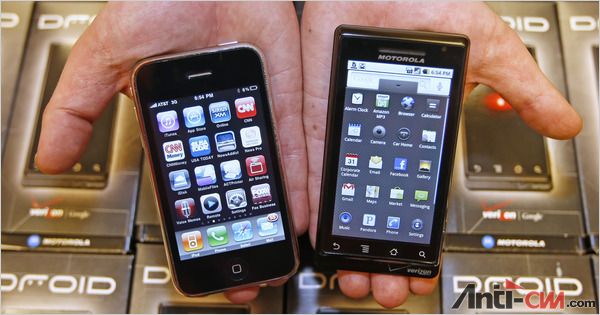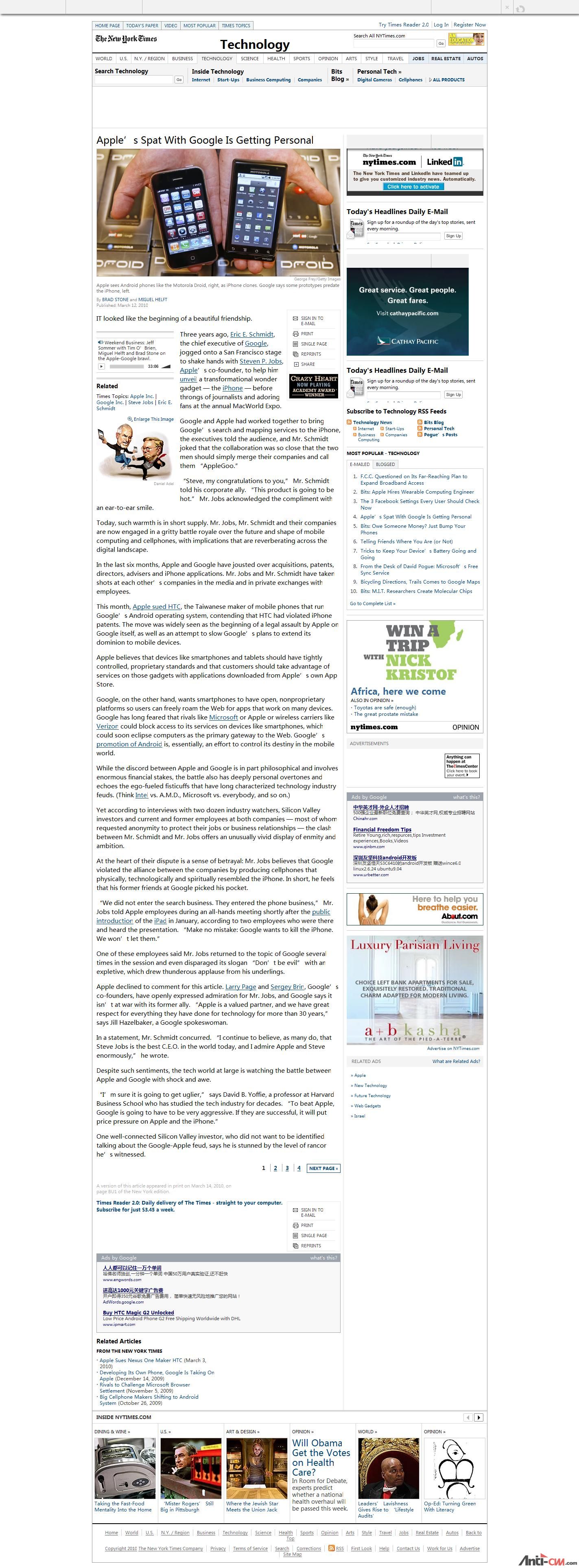|
|
本帖最后由 triangel 于 2010-3-17 19:13 编辑
http://www.nytimes.com/2010/03/14/technology/14brawl.html?pagewanted=3&ref=business

Apple sees Android phones like the Motorola Droid, right, as iPhoneclones. Google says some prototypes predate the iPhone, left.
IT looked like the beginning of a beautiful friendship.
Three years ago, Eric E. Schmidt, the chief executive of Google, jogged onto a San Francisco stage to shake hands with Steven P. Jobs, Apple’s co-founder, to help him unveil a transformational wonder gadget — the iPhone — before throngs of journalists and adoring fans at the annual MacWorld Expo.
Google and Apple had worked together to bring Google’s search andmapping services to the iPhone, the executives told the audience, andMr. Schmidt joked that the collaboration was so close that the two menshould simply merge their companies and call them “AppleGoo.”
“Steve, my congratulations to you,” Mr. Schmidt told his corporateally. “This product is going to be hot.” Mr. Jobs acknowledged thecompliment with an ear-to-ear smile.
Today, such warmth is in short supply. Mr. Jobs, Mr. Schmidt and theircompanies are now engaged in a gritty battle royale over the future andshape of mobile computing and cellphones, with implications that arereverberating across the digital landscape.
In the last six months, Apple and Google have jousted overacquisitions, patents, directors, advisers and iPhone applications. Mr.Jobs and Mr. Schmidt have taken shots at each other’s companies in themedia and in private exchanges with employees.
This month, Apple sued HTC,the Taiwanese maker of mobile phones that run Google’s Androidoperating system, contending that HTC had violated iPhone patents. Themove was widely seen as the beginning of a legal assault by Apple onGoogle itself, as well as an attempt to slow Google’s plans to extendits dominion to mobile devices.
Apple believes that devices like smartphones and tablets should havetightly controlled, proprietary standards and that customers shouldtake advantage of services on those gadgets with applicationsdownloaded from Apple’s own App Store.
Google, on the other hand, wants smartphones to have open,nonproprietary platforms so users can freely roam the Web for apps thatwork on many devices. Google has long feared that rivals like Microsoft or Apple or wireless carriers like Verizoncould block access to its services on devices like smartphones, whichcould soon eclipse computers as the primary gateway to the Web.Google’s promotion of Android is, essentially, an effort to control its destiny in the mobile world.
While the discord between Apple and Google is in part philosophical andinvolves enormous financial stakes, the battle also has deeply personalovertones and echoes the ego-fueled fisticuffs that have longcharacterized technology industry feuds. (Think Intel vs. A.M.D., Microsoft vs. everybody, and so on.)
Yet according to interviews with two dozen industry watchers, SiliconValley investors and current and former employees at both companies —most of whom requested anonymity to protect their jobs or businessrelationships — the clash between Mr. Schmidt and Mr. Jobs offers anunusually vivid display of enmity and ambition.
At the heart of their dispute is a sense of betrayal: Mr. Jobs believesthat Google violated the alliance between the companies by producingcellphones that physically, technologically and spiritually resembledthe iPhone. In short, he feels that his former friends at Google pickedhis pocket.
“We did not enter the search business. They entered the phonebusiness,” Mr. Jobs told Apple employees during an all-hands meetingshortly after the public introduction of the iPadin January, according to two employees who were there and heard thepresentation. “Make no mistake: Google wants to kill the iPhone. Wewon’t let them.”
One of these employees said Mr. Jobs returned to the topic of Googleseveral times in the session and even disparaged its slogan “Don’t beevil” with an expletive, which drew thunderous applause from hisunderlings.
Apple declined to comment for this article. Larry Page and Sergey Brin,Google’s co-founders, have openly expressed admiration for Mr. Jobs,and Google says it isn’t at war with its former ally. “Apple is avalued partner, and we have great respect for everything they have donefor technology for more than 30 years,” says Jill Hazelbaker, a Googlespokeswoman.
In a statement, Mr. Schmidt concurred. “I continue to believe, as manydo, that Steve Jobs is the best C.E.O. in the world today, and I admireApple and Steve enormously,” he wrote.
Despite such sentiments, the tech world at large is watching the battle between Apple and Google with shock and awe.
“I’m sure it is going to get uglier,” says David B. Yoffie, a professorat Harvard Business School who has studied the tech industry fordecades. “To beat Apple, Google is going to have to be very aggressive.If they are successful, it will put price pressure on Apple and theiPhone.”
One well-connected Silicon Valley investor, who did not want to beidentified talking about the Google-Apple feud, says he is stunned bythe level of rancor he’s witnessed.

|
Apple, Getting, google, spat, 纽约时报, Apple, Getting, google, spat, 纽约时报, Apple, Getting, google, spat, 纽约时报
|